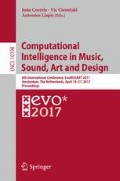Abstract
The aim of this study is to find to what extent computers can assist humans in the creative process of writing titles, using psychological tests for creativity that are typically used for humans only. To this end, a computer tool was designed that recommends new titles to users, based on knowledge generated from a pre-built corpus. This paper gives a description of both the development of the system as well as tests applied to the participants, derived from classical psychological tests for human creativity. A total of 89 participants divided in two groups completed two tasks which consisted of generating titles for paintings. One group was allowed to use a template-based system for generating titles, the other group did not use any tools. The results of the experiments show higher creativity scores for the combination of participants augmented by a computational creativity tool.
Access this chapter
Tax calculation will be finalised at checkout
Purchases are for personal use only
References
Bertin-Mahieux, T., Ellis, D.P., Whitman, B., Lamere, P.: The million song dataset. In: ISMIR 2011: Proceedings of the 12th International Society for Music Information Retrieval Conference (2011)
Bird, S.: NLTK: the natural language toolkit. In: Proceedings of the COLING/ACL on Interactive Presentation Sessions. Association for Computational Linguistics (2006)
Chen, C.: Boundless creativity: evidence for the domain generality of individual differences in creativity. J. Creative Behav. 40, 179–199 (2006)
Cope, D.: Experiments in music intelligence. In: Proceedings of the International Computer Music Conference. Computer Music Assn., San Francisco (1987)
Engelbart, D.: Augmenting Human Intellect: A Conceptual Framework. SRI Summary Report AFOSR-3223, October 1962
Eisenberger, R., Rhoades, L.: Incremental effects of reward on creativity. J. Pers. Soc. Psychol. 81, 728–741 (2001)
Guilford, J.P.: Creativity. Am. Psychol. 5(9), 444–454 (1950)
Guilford, J.P.: The Nature of Human Intelligence. McGraw-Hill, New York (1967)
Lari, K., Young, S.J.: The estimation of stochastic context-free grammars using the inside-outside algorithm. In: Computer Speech and Language (1990)
Licklider, J.C.R.: Man computer symbiosis. IRE Transactions on Human Factors in Electronics, HFE-1, 4–11 (1960)
Settles, B., 2010. Computational creativity tools for songwriters. In: Proceedings of the NAACL HLT 2010 Second Workshop on Computational Approaches to Linguistic Creativity. Association for Computational Linguistics
Torrance, E.P.: The Torrance Tests of Creative Thinking-Norms-Technical Manual Research Edition-Verbal Tests, Forms A and B-Figural Tests, Forms A and B. Personnel Press, Princeton (1966)
Thompson, D.: Hallo Spaceboy: The Rebirth of David Bowie. ECW Press, Toronto (2007)
Toole, B.: Poetical science. Byron J. 15, 55–65 (1987)
Van Deemter, K., Krahmer, E., Theune, M.: Real versus template-based natural language generation: a false opposition? In: Computational Linguistics (2005)
Wallach, M.A., Kogan, N.: Modes of thinking in young children: a study of the creativity- intelligence distinction Holt. Rinehart & Winston, New York (1965)
Zhu, X., Xu, Z., Khot, T.: How creative is your writing? In: Proceedings of the Workshop on Computational Approaches to Linguistic Creativity (CALC) (2009)
Author information
Authors and Affiliations
Corresponding author
Editor information
Editors and Affiliations
Rights and permissions
Copyright information
© 2017 Springer International Publishing AG
About this paper
Cite this paper
Arenas Rebolledo, Y.S., van der Putten, P., Lamers, M.H. (2017). Assessing Augmented Creativity: Putting a Lovelace Machine for Interactive Title Generation Through a Human Creativity Test. In: Correia, J., Ciesielski, V., Liapis, A. (eds) Computational Intelligence in Music, Sound, Art and Design. EvoMUSART 2017. Lecture Notes in Computer Science(), vol 10198. Springer, Cham. https://doi.org/10.1007/978-3-319-55750-2_18
Download citation
DOI: https://doi.org/10.1007/978-3-319-55750-2_18
Published:
Publisher Name: Springer, Cham
Print ISBN: 978-3-319-55749-6
Online ISBN: 978-3-319-55750-2
eBook Packages: Computer ScienceComputer Science (R0)

